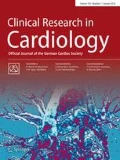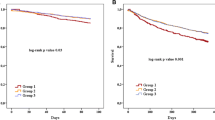Abstract
Background
Both loop diuretics (LDs) and congestion have been related to worse heart failure (HF) outcome. The relationship between the cause and effect is unknown. The aim of this study was to investigate the interaction between congestion, diuretic use and HF outcome.
Methods
Six hundred and twenty-two chronic HF patients from TIME-CHF were studied. Congestion was measured by means of a clinical congestion index (CCI). Loop diuretic dose was considered at baseline and month 6. Treatment intensification was defined as the increase in LD dose over 6 months or loop diuretic and thiazide or thiazide-like diuretic co-administration. The end-points were survival and HF hospitalisation-free survival.
Results
High-LD dose at baseline and month 6 (≥ 80 mg of furosemide per day) was not identified as an independent predictor of outcome. CCI at baseline remained independently associated with impaired survival [hazard ratio (HR) 1.34, (95% confidence interval) (95% CI) (1.20–1.50), p < 0.001] and HF hospitalisation-free survival [HR 1.09, 95% CI (1.02–1.17), p = 0.015]. CCI at month 6 was independently associated with HF hospitalisation-free survival [HR 1.24, 95% CI (1.11–1.38), p < 0.001]. Treatment intensification was independently associated with survival [HR 1.75, 95% CI (1.19–1.38), p = 0.004] and HF hospitalisation-free survival [HR 1.69, 95% CI (1.22–2.35), p = 0.002]. Patients undergoing treatment intensification resulting in decongestion had better outcome than patients with persistent (worsening) congestion despite LD dose up-titration (p < 0.001).
Conclusion
Intensification of pharmacological decongestion but not the actual LD dose was related to poor outcome in chronic HF. If treatment intensification translated into clinical decongestion, outcome was better than in case of persistent or worsening congestion.
Graphic abstract



Similar content being viewed by others
Data availability
Raw data are available upon request.
References
Simonavičius J, Knackstedt C, Brunner-La Rocca H-P (2019) Loop diuretics in chronic heart failure: how to manage congestion? Heart Fail Rev 24:17–30. https://doi.org/10.1007/s10741-018-9735-7
Ponikowski P, Voors AA, Anker SD et al (2016) 2016 ESC Guidelines for the diagnosis and treatment of acute and chronic heart failureThe Task Force for the diagnosis and treatment of acute and chronic heart failure of the European Society of Cardiology (ESC)Developed with the special contribution of the Heart Failure Association (HFA) of the ESC. Eur Heart J 37:2129–2200. https://doi.org/10.1093/eurheartj/ehw128
Simonavičius J, Sanders van-Wijk S, Rickenbacher P et al (2019) Prognostic significance of longitudinal clinical congestion pattern in chronic heart failure: insights from TIME-CHF trial. Am J Med 132:e679–e692. https://doi.org/10.1016/j.amjmed.2019.04.010
Zile MR, Bennett TD, St John Sutton M et al (2008) Transition from chronic compensated to acute decompensated heart failure: pathophysiological insights obtained from continuous monitoring of intracardiac pressures. Circulation 118:1433–1441. https://doi.org/10.1161/CIRCULATIONAHA.108.783910
Testani JM, Chen J, McCauley BD et al (2010) Potential effects of aggressive decongestion during the treatment of decompensated heart failure on renal function and survival. Circulation 122:265–272. https://doi.org/10.1161/CIRCULATIONAHA.109.933275
Palazzuoli A, Ruocco G, Franci B et al (2020) Ultrasound indices of congestion in patients with acute heart failure according to body mass index. Clin Res Cardiol. https://doi.org/10.1007/s00392-020-01642-9
Kobayashi M, Girerd N, Duarte K et al (2020) Prognostic impact of plasma volume estimated from hemoglobin and hematocrit in heart failure with preserved ejection fraction. Clin Res Cardiol. https://doi.org/10.1007/s00392-020-01639-4
Kobayashi M, Rossignol P, Ferreira JP et al (2019) Prognostic value of estimated plasma volume in acute heart failure in three cohort studies. Clin Res Cardiol 108:549–561. https://doi.org/10.1007/s00392-018-1385-1
Abraham WT, Adamson PB, Bourge RC et al (2011) Wireless pulmonary artery haemodynamic monitoring in chronic heart failure: a randomised controlled trial. Lancet 377:658–666. https://doi.org/10.1016/S0140-6736(11)60101-3
Mullens W, Damman K, Testani JM et al (2020) Evaluation of kidney function throughout the heart failure trajectory: a position statement from the heart failure association of the European society of cardiology. Eur J Heart Fail 22:584–603. https://doi.org/10.1002/ejhf.1697
Brunner-La Rocca H-P, Linssen GC, Smeele FJ et al (2019) Contemporary drug treatment of chronic heart failure with reduced ejection fraction: the CHECK-HF registry. JACC Heart Fail 7:13–21. https://doi.org/10.1016/j.jchf.2018.10.010
Eshaghian S, Horwich TB, Fonarow GC (2006) Relation of loop diuretic dose to mortality in advanced heart failure. Am J Cardiol 97:1759–1764. https://doi.org/10.1016/j.amjcard.2005.12.072
Damman K, Kjekshus J, Wikstrand J et al (2016) Loop diuretics, renal function and clinical outcome in patients with heart failure and reduced ejection fraction. Eur J Heart Fail 18:328–336. https://doi.org/10.1002/ejhf.462
Lawson CA, Testani JM, Mamas M et al (2018) Chronic kidney disease, worsening renal function and outcomes in a heart failure community setting: a UK national study. Int J Cardiol 267:120–127. https://doi.org/10.1016/j.ijcard.2018.04.090
Vardeny O, Claggett B, Kachadourian J et al (2019) Reduced loop diuretic use in patients taking sacubitril/valsartan compared with enalapril: the PARADIGM-HF trial. Eur J Heart Fail 21:337–341. https://doi.org/10.1002/ejhf.1402
Pfisterer M, Buser P, Rickli H et al (2009) BNP-guided vs symptom-guided heart failure therapy: the trial of intensified vs standard medical therapy in elderly patients with congestive heart failure (TIME-CHF) randomized trial. JAMA 301:383–392. https://doi.org/10.1001/jama.2009.2
Brunner-La Rocca HP, Buser PT, Schindler R et al (2006) Management of elderly patients with congestive heart failure–design of the trial of intensified versus standard medical therapy in elderly patients with congestive heart failure (TIME-CHF). Am Heart J 151:949–955. https://doi.org/10.1016/j.ahj.2005.10.022
Simonavicius J, Puronaite R, Brunner-La Rocca H-P (2020) The reply. Am J Med 133:e330–e332. https://doi.org/10.1016/j.amjmed.2019.12.011
Maeder MT, Rickli H, Pfisterer ME et al (2012) Incidence, clinical predictors, and prognostic impact of worsening renal function in elderly patients with chronic heart failure on intensive medical therapy. Am Heart J 163(407–414):414.e1. https://doi.org/10.1016/j.ahj.2011.12.003
Mullens W, Verbrugge FH, Nijst P, Tang WHW (2017) Renal sodium avidity in heart failure: from pathophysiology to treatment strategies. Eur Heart J 38:1872–1882. https://doi.org/10.1093/eurheartj/ehx035
Anuradha L, McNulty SE, Mentz RJ et al (2015) Relief and recurrence of congestion during and after hospitalization for acute heart failure. Circ Heart Failure 8:741–748. https://doi.org/10.1161/CIRCHEARTFAILURE.114.001957
Selvaraj S, Claggett B, Pozzi A et al (2019) prognostic implications of congestion on physical examination among contemporary patients with heart failure and reduced ejection fraction: PARADIGM-HF. Circulation 140:1369–1379. https://doi.org/10.1161/CIRCULATIONAHA.119.039920
Yancy CW, Jessup M, Bozkurt B et al (2013) 2013 ACCF/AHA guideline for the management of heart failure: a report of the American college of cardiology foundation/American heart association task force on practice guidelines. Circulation 128:e240–e327. https://doi.org/10.1161/CIR.0b013e31829e8776
Ellison DH, Felker GM (2017) Diuretic treatment in heart failure. N Engl J Med 377:1964–1975. https://doi.org/10.1056/NEJMra1703100
Felker GM, Lee KL, Bull DA et al (2011) Diuretic strategies in patients with acute decompensated heart failure. N Engl J Med 364:797–805. https://doi.org/10.1056/NEJMoa1005419
Rohde LE, Rover MM, Figueiredo Neto JA et al (2019) Short-term diuretic withdrawal in stable outpatients with mild heart failure and no fluid retention receiving optimal therapy: a double-blind, multicentre, randomized trial. Eur Heart J 40:3605–3612. https://doi.org/10.1093/eurheartj/ehz554
Simonavicius J, Brunner-La Rocca H-P (2020) Do chronic heart failure patients receive optimal decongestive interventions in a real-life setting? Eur J Heart Fail. https://doi.org/10.1002/ejhf.1839
Ahmed A, Husain A, Love TE et al (2006) Heart failure, chronic diuretic use, and increase in mortality and hospitalization: an observational study using propensity score methods. Eur Heart J 27:1431–1439. https://doi.org/10.1093/eurheartj/ehi890
Hamaguchi S, Kinugawa S, Tsuchihashi-Makaya M et al (2012) Loop diuretic use at discharge is associated with adverse outcomes in hospitalized patients with heart failure: a report from the Japanese cardiac registry of heart failure in cardiology (JCARE-CARD). Circ J 76:1920–1927
Jm TM, M P, D K et al (2020) Higher doses of loop diuretics limit uptitration of angiotensin-converting enzyme inhibitors in patients with heart failure and reduced ejection fraction. Clin Res Cardiol 109:1048–1059. https://doi.org/10.1007/s00392-020-01598-w
Neuberg GW, Miller AB, O’Connor CM et al (2002) Diuretic resistance predicts mortality in patients with advanced heart failure. Am Heart J 144:31–38
Abdel-Qadir HM, Tu JV, Yun L et al (2010) Diuretic dose and long-term outcomes in elderly patients with heart failure after hospitalization. Am Heart J 160:264-271.e1. https://doi.org/10.1016/j.ahj.2010.05.032
Dini FL, Guglin M, Simioniuc A et al (2012) Association of furosemide dose with clinical status, left ventricular dysfunction, natriuretic peptides, and outcome in clinically stable patients with chronic systolic heart failure. Congest Heart Fail 18:98–106. https://doi.org/10.1111/j.1751-7133.2011.00252.x
Trullàs J-C, Casado J, Morales-Rull J-L et al (2019) Prevalence and outcome of diuretic resistance in heart failure. Intern Emerg Med 14:529–537. https://doi.org/10.1007/s11739-018-02019-7
Jardim SI, Ramos Dos Santos L, Araújo I et al (2018) A 2018 overview of diuretic resistance in heart failure. Rev Port Cardiol 37:935–945. https://doi.org/10.1016/j.repc.2018.03.014
Galluzzo A, Frea S, Boretto P et al (2020) Spot urinary sodium in acute decompensation of advanced heart failure and dilutional hyponatremia: insights from DRAIN trial. Clin Res Cardiol. https://doi.org/10.1007/s00392-020-01617-w
Shah N, Madanieh R, Alkan M et al (2017) A perspective on diuretic resistance in chronic congestive heart failure. Ther Adv Cardiovasc Dis 11:271–278. https://doi.org/10.1177/1753944717718717
Kaissling B, Bachmann S, Kriz W (1985) Structural adaptation of the distal convoluted tubule to prolonged furosemide treatment. Am J Physiol 248:F374-381. https://doi.org/10.1152/ajprenal.1985.248.3.F374
Rao VS, Planavsky N, Hanberg JS et al (2017) Compensatory distal reabsorption drives diuretic resistance in human heart failure. J Am Soc Nephrol 28:3414–3424. https://doi.org/10.1681/ASN.2016111178
Brunner-La Rocca H-P, Knackstedt C, Eurlings L et al (2015) Impact of worsening renal function related to medication in heart failure. Eur J Heart Fail 17:159–168. https://doi.org/10.1002/ejhf.210
Hillege Hans L, Girbes Armand RJ, de Kam Pieter et al (2000) Renal function, neurohormonal activation, and survival in patients with chronic heart failure. Circulation 102:203–210. https://doi.org/10.1161/01.CIR.102.2.203
Rangaswami J, Bhalla V, Blair JEA et al (2019) Cardiorenal syndrome: classification, pathophysiology, diagnosis, and treatment strategies: a scientific statement from the American Heart Association. Circulation 139:e840–e878. https://doi.org/10.1161/CIR.0000000000000664
Boulos J, Darawsha W, Abassi ZA et al (2019) Treatment patterns of patients with acute heart failure who develop acute kidney injury. ESC Heart Fail 6:45–52. https://doi.org/10.1002/ehf2.12364
Metra M, Davison B, Bettari L et al (2012) Is worsening renal function an ominous prognostic sign in patients with acute heart failure? The role of congestion and its interaction with renal function. Circ Heart Fail 5:54–62. https://doi.org/10.1161/CIRCHEARTFAILURE.111.963413
Damman K, Testani JM (2015) The kidney in heart failure: an update. Eur Heart J 36:1437–1444. https://doi.org/10.1093/eurheartj/ehv010
Stevenson LW, Perloff JK (1989) The limited reliability of physical signs for estimating hemodynamics in chronic heart failure. JAMA 261:884–888
McMurray JJV, Solomon SD, Inzucchi SE et al (2019) Dapagliflozin in patients with heart failure and reduced ejection fraction. New Engl J Med. https://doi.org/10.1056/NEJMoa1911303 (0:null)
Packer M, Anker SD, Butler J et al (2020) Cardiovascular and renal outcomes with empagliflozin in heart failure. New Engl J Med. https://doi.org/10.1056/NEJMoa2022190 (0:null)
Mordi NA, Mordi IR, Singh JS et al (2020) Renal and cardiovascular effects of SGLT2 inhibition in combination with loop diuretics in patients with Type 2 diabetes and chronic heart failure: the RECEDE-CHF trial. Circulation. https://doi.org/10.1161/CIRCULATIONAHA.120.048739
Acknowledgements
The authors would like to thank the participants and investigators of the TIME-CHF.
Funding
This substudy has no specific funding. The TIME-CHF study was sponsored by the Helmut Horten Foundation (Lugano, Switzerland), and by smaller unrestricted grants from Roche Diagnostics, AstraZeneca, Novartis, Menarini, Pfizer, Servier, Roche Pharma, and Merck.
Author information
Authors and Affiliations
Corresponding author
Ethics declarations
Conflict of interest
The authors have no conflicts of interest/competing interests to declare.
Ethics approval
The investigation was approved by the local ethics committees.
Consent to participate
All the participants provided their written informed consent.
Consent for publication
The consent for publication was a part of the written informed consent provided by each participant.
Rights and permissions
About this article
Cite this article
Simonavičius, J., Maeder, M.T., Eurlings, C.G.M.J. et al. Intensification of pharmacological decongestion but not the actual daily loop diuretic dose predicts worse chronic heart failure outcome: insights from TIME-CHF. Clin Res Cardiol 110, 1221–1233 (2021). https://doi.org/10.1007/s00392-020-01779-7
Received:
Accepted:
Published:
Issue Date:
DOI: https://doi.org/10.1007/s00392-020-01779-7




